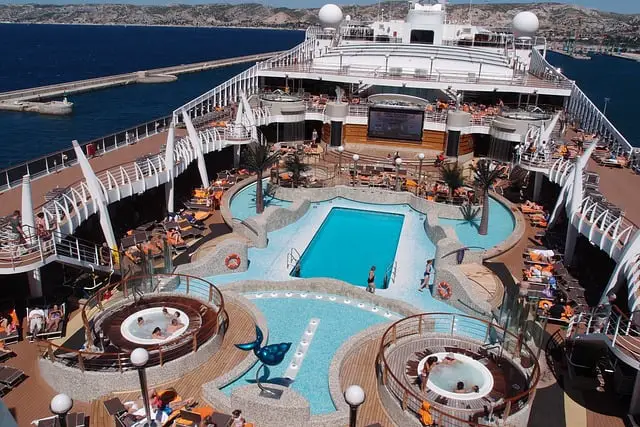While saltwater pools are increasingly common in home pools and even public pools, what about on cruise ships? These floating cities are getting bigger and full of more great amenities and the largest ships often have several pools with water features.
Many cruise ships now have saltwater pools on board. Saltwater pools are a popular choice for cruise ships because they offer safety, cost and health benefits over traditional chlorine pools, and they can provide a more authentic ocean experience for passengers.
However, many cruise ships still have traditional chlorinated pools as well. It’s always a good idea to check with your specific cruise line to see what types of pools they have on board if it’s a concern for you.
Benefits to swimmers on a cruise ship with saltwater pools
There are several benefits of having saltwater pools on a cruise ship for pool users:
- More natural and gentle on the skin: Saltwater pools contain a natural non-commercial version of chlorine whereas traditional pools use chemical chlorine, making them more natural and gentler on the skin. This is especially important on a cruise ship where passengers spend extended periods in the pool.
- Improved hygiene: Saltwater pools are more effective at killing bacteria and other microorganisms compared to traditional pools partly because chlorine levels tend to be consistent over time. Chemical chlorine on the other hand is added in bulk which spikes the chlorine level quickly and necessitates closing the pool for a period. This helps to ensure that the water remains clean and hygienic, which is essential on a cruise ship where many people are using the same pool including children who may not be toilet trained.
- Less maintenance: Saltwater pools require less maintenance compared to traditional pools, as the saltwater system tend to to help keep the water balanced with less effort and testing. This means that crew members can spend less time maintaining the pool and more time attending to other tasks which may potentially mean less downtime for swimmers who don’t have to wait to use it.
- Eco-friendly: Saltwater pools are more eco-friendly compared to traditional pools, as they require fewer chemicals and are less likely to harm the environment. This is important on a cruise ship where environmental sustainability is becoming increasingly important. It’s increasingly mandated that cruise ships offer environmentally friendly options and they often draw attention to it for marketing reasons, too.
Overall, a cruise ship with saltwater pools can provide a more enjoyable and comfortable experience for passengers, while also being more hygienic and eco-friendly.
Safety benefits on a cruise ship with saltwater pools
Health and maintenance benefits aren’t the only ones experienced with a saltwater pool. All pools – whether regularly chlorinated or saltwater – require chemicals from time to time, that’s just how pools operate. On a cruise ship which moves from port to port, the fewer chemicals you have to hold and store on board, the better for several reasons i.e. cost, availability, safety.
Saltwater pool systems additionally have several safety benefits over traditional chlorine systems on a cruise ship that are related to safety:
- Reduced risk of chemical exposure: Chlorine is a powerful chemical that can be hazardous if not handled properly. Saltwater pools, on the other hand, use a natural process called electrolysis to produce chlorine from salt, which greatly reduces the risk of exposure to harmful chemicals. Even if a cruise ship has to store chlorine for emergency use, it’ll be a much lower amount than a chemically chlorinated pool requires.
- Lower risk of eye and skin irritation: Traditional chlorine pools can cause eye and skin irritation, especially if the chlorine levels are not properly balanced. Saltwater pools contain a naturally produced chlorine which tends to be gentler on the skin and eyes, reducing the risk of irritation. Bathers won’t feel the need to shower afterwards simply to get the “chlorine smell” off their bodies.
- Improved air quality: Chlorine can evaporate from traditional pools and contribute to poor air quality in enclosed spaces, such as cruise ship decks. Saltwater pools produce fewer chloramines, which are the byproducts of chlorine and can cause respiratory problems and eye irritation in the extreme.
- Better water quality: Saltwater pools are more effective at killing bacteria and other microorganisms compared to traditionally chlorinated pools. This helps to ensure that the water remains clean and safe for passengers to swim in.
Aspects of a cruise ship saltwater pool systems
Needless to say, the salt chlorination system used on a cruise ship would need to be much more robust and powerful than the one used by your backyard pool.
Here are some interesting bullets regarding the types of commercially-available systems available for saltwater pools onboard a cruise ship:
- High end cruise ship chlorination systems can produce upwards of 28 lbs of chlorine per day. A chlorinator for a residential pool typically produces 0.5 lb – 1.5 lbs per day by comparison.
- Cruise ship pool systems are available to handle pools up to 1,000,000 gallons in size.
- Systems can be purchased to fully automate management and feeder tasks that are usually done manually.
- Other optional features include self cleaning salt cells as well as salt cell lifespans up to 15,000 hours.
- System manufacturers suggest that sanitation costs can be reduced by up to 25% over using chemical chlorine, meaning a system could pay for itself within as little as 18 months.
- Reduces the need to store and handle chemical chlorine which helps to reduce the ship’s marine pollutants which is increasingly being monitored by governments.

